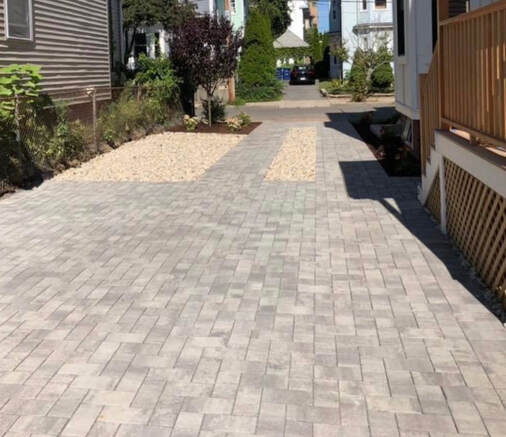 What are permeable pavers? Permeable pavers are paving materials used in an installation system for hardscaping surfaces. They are porous, allowing water to infiltrate through the pavers and into the ground underneath. Permeable pavers are as strong or stronger than traditional paving materials like asphalt and concrete and are just as durable. How do they work? Permeable pavers are installed with joints that are filled with gravel and are designed to allow water to penetrate their surfaces, flow into the rock base, and absorb into the ground. Other paving systems (asphalt, concrete, compacted gravel) can collect stormwater, resulting in puddles or run-off. Permeable pavers, however, allow for a more natural simulation of the ground reacting to rainwater, with rain absorption on the spot. Why are they better than traditional pavers? Hardscaped surfaces that use permeable pavers help immensely with stormwater management. They minimize water runoff and flood risks (which is typically caused by traditional paving materials like concrete, asphalt, and gravel). Runoff is dangerous for homeowners, as it can often run into basements, crawl spaces, or foundations without the homeowners' knowledge. It can also be detrimental to cities and towns, as water runoff picks up pollutants as it flows toward and into sewers. Eventually, this runoff flows into our the natural waterways. Major rainwater runoff from sever storms can overwhelm sewer systems, causing flooding or other water management issues. They can be plowed easily with no risk of damage to the paver surface. Are they more or less costly than traditional pavers? Initial costs to install permeable pavers are generally higher than traditional pavers or asphalt, but similar to concrete. The cost-benefit is based on the life cycle of the surface. There are major savings in the minimized risk of damage from runoff and flooding as well as the reduced need for sealing or replacing. While other surfaces (or underground utilities) that need repair may require a complete tear up, permeable pavers can be removed and replaced individually. Ongoing maintenance is cheap and simple. For residential properties, use a leftest blower to clear out paver joints as needed. For commercial properties, restrict debris from clogging the joints by blowing regularly and/or vacuuming surfaces every year or two. Permeable pavers are environmentally-conscious surfaces for patios, walkways, parking lots, roadways, fire lanes, driveways and other paving functions that absorb water and prevent flooding.
14 Comments
|
Archives
February 2024
AuthorRodrigo Dos Anjos Categories
All
|
Gardenin' Angels, Landscape Management & Construction
A preferred landscaper, serving Southeastern Massachusetts
11 Renker Drive, Easton, MA 02375
774-284-1171
[email protected]
Privacy Policy • Terms of Use

 RSS Feed
RSS Feed